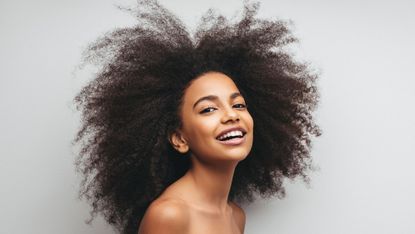

My quest for healthy hair will likely never end. There's no shampoo and conditioner duo, hair oil, or leave-in conditioner that I won't try in my quest for shine, bounce, and hydration—especially considering the specific needs of my curly hair. But while I take the best care of my hair I can, I still find myself dealing with damage (like split ends, dryness, and a dry scalp) because of factors like changing weather, pollution, and water quality. So, to mitigate damage when those issues rear their ugly heads, I keep a few of the best hair masks for damaged hair in my beauty cabinet at all times to save the day.
"A hair mask is an intense deep conditioner—usually much thicker in consistency— that should be used on hair that is dry or on chemically treated hair," explains Carolyn Aronson, founder and CEO of It's A 10 Haircare. "Incorporating a hair mask into your haircare routine improves the condition of the hair shaft. With an influx in moisture and hydration, the hair can become healthier and stronger."
Hairstylist and brand educator for The Mane Choice Cataanda James agrees, adding, "Hair masks provide an accelerated boost of nourishment to the strands, which is what makes these formulas more intense than traditional conditioners."
But unlike traditional conditioners, hair masks are not meant to be used every day or even every time you wash your hair. Plus, hair masks are varied in terms of the benefits they provide, how long they should be left in, and the hair types they're formulated for. All these variations can be a little overwhelming, so I asked Aronson and James to break down everything there is to know about hair masks. And, with their help, I've rounded up some of the best hair masks, whether you're struggling with damage, dehydration, or you're simply looking to inject a little extra moisture into your hair routine.
Overview
- Best Hair Mask for Color-Damaged Hair: Kérastase Resistance Mask for Severely Damaged Hair
- Best Hair Mask for Heat-Damaged Hair: Briogeo Don't Despair, Repair! Deep Conditioning Mask
- Best Hair Mask for Breakage: The Mane Choice Ancient Egyptian Anti-Breakage Hair Mask
- Best Hair Mask for Natural Hair: SheaMoisture Raw Shea Butter Deep Treatment Masque
- Best Hair Mask for Straight Hair: ALTERNA Haircare My Hair My Canvas Cool Hydrations Nourishing Masque
- Best Hair Mask Overall: Act + Acre Restorative Hair Mask
What to Look For in a Hair Mask
- Benefits
According to James, there are three main types of hair masks: moisture, protein, and those that combine the two. "Protein-based hair masks strengthen your hair and help rebuild the bonds that are often broken down by over-manipulation from styling your natural texture and curls, or from chemical treatments," she explains. "Hydrating and moisture-based hair masks replenish essential nutrients to the hair for a healthier look and feel, and they defend against further damage."
Therefore, if you're considering incorporating a hair mask into your regimen, take a good look at your hair and consider what aspects of its health you'd like to improve. "Assess your hair for any split ends, dryness, or breakage," Aronson advises. "Depending on the state of your hair, it may indicate which type of hair mask you would need to resolve the issue. If your hair is dry and brittle, you may need a hair mask that provides intense hydration. If you have breakage or split ends, a protein or bond-building hair mask is best."
James adds that it may be helpful to write down your concerns while assessing your hair, so that you can easily employ process of elimination and cross-reference your list with the hair mask options you see while shopping. "Hair masks will have key benefits and ingredient call outs on their packaging, most commonly found on the front of the label. If you do not see your concern called out, that particular product may not yield the best results."
- Hair Type and Texture
And if you're having trouble identifying the type of TLC your hair needs, James suggests taking an online self-assessment "to determine your individual hair type, texture, and to pinpoint specific hair concerns that you would like to address." In particular, she recommends The Mane Choice's Hair Quiz, which recommends products based on the user's preferences, hair type, needs, and lifestyle.
"Textured and chemically treated hair typically are a good fit for hair mask treatments, as the strands can be prone to dryness or breakage," says Aronson. "Textured hair thrives when moisturized and hydrated with quality ingredients and water. The same goes for chemically treated hair: It needs ingredients that will restore the hair shaft after being broken down by chemicals."
James agrees, adding that curly hair tends to be drier than straight hair. Plus, she says, "Hair masks also help ease detangling to promote strands' elasticity for length retention and curl formation."
On the other hand, if your hair is on the thin side and it's not curly or textured, both Aronson and James note that masks may not be best.
"Generally, hair masks are heavy due to the use of creams and oils, and can weigh finer hair textures down," says Aronson. In those cases, James suggests using a light hair lotion or cream for hydration instead.
Best Hair Masks for Damaged Hair
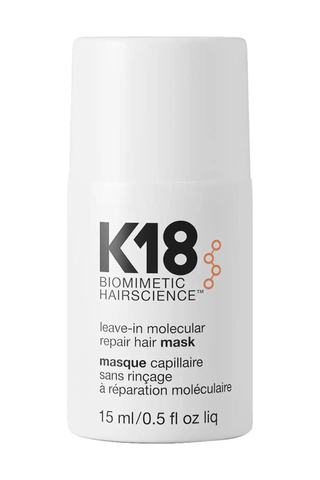
For damaged hair that can’t seem to rebound to a healthy state, K18 is the way to go. It’s the A team, the all-star, and the MVP for distraught strands. I reach for this heavy hitter right after getting my hair bleached or after a week of straight heat styling because I’m blindly confident that my hair will be refreshed by it’s split-end bonding superpowers. Perhaps my favorite part about it though, it’s that it’s leave-in friendly. I don’t have to set aside a special set of time to soak and rinse—it fits perfectly into my routine.
Pros: Heavy duty repair; Works on all hair types; Doesn’t need to be washed out
Cons: Expensive
Customer Review: "I use this about once a week, and it does help my hair health. It’s easy to use, and my hair feels smoother and has significantly less split ends than before I started using it." -Sephora
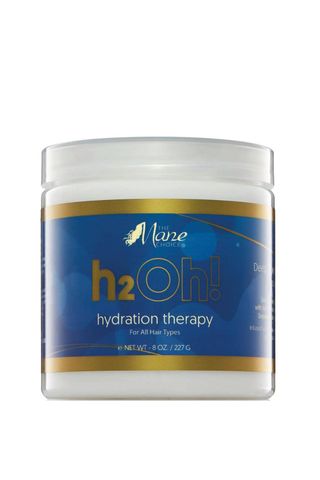
"This deeply moisturizing formula makes detangling easier, improves manageability and infuses the hair and scalp with intense hydration to help reduce breakage," James attests. "It contains sea soothing complex and sarcosine, and is infused with biotin, Vitamins A, B, and C, and sea minerals, all of which help maintain hair's moisture balance and improve manageability. I recommend this for all hair types."
Pros: expert-approved; reduces breakage; detangling
Cons: contains sulfates
Customer Review: "I love this stuff!! It helps to make my long hair soft and beautiful. I have highlighted hair and sometimes it can look dried out. This product helps to prevent breakage and a beautiful shine to my hair." -Sephora
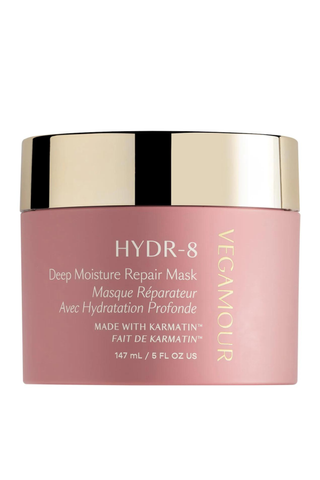
If you have fine hair, you know the hair mask struggle. A few minutes of “repair” and you’re left with oily, flat roots that don’t recover for three to five washes. Sound familiar? If it does, allow me to direct your attention to Vegamour. The brand, which is famed for its hair thickening abilities, created this uber-hydrating mask in a way that allows even the finest hair to remain weightless and voluminous (well, as voluminous as possible). Just three to five minutes of this treatment, and your hair will be left moisturized, stronger, and less frizzy–for up to 72 hours.
Pros: Doesn’t weigh down hair; Good for all hair types and textures
Cons: Some say it leaves residue on the scalp; small container
Customer Review: "ACTUALLY GOOD!! My hair feels and looks so soft after I use this. And it smells really good. But it’s very expensive and you don’t get a lot of product." -Sephra
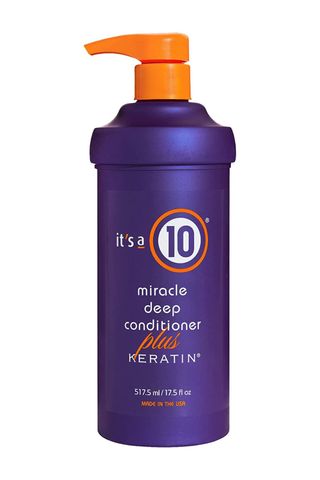
I know: this is called a deep conditioner—not a hair mask. But rest assured the powerful formula is still going to give your hair the intensive pick-me-up it's craving. Aronson highly recommends this product, writing, "It is keratin-infused for that extra boost of protein which helps rebuild hair strength." Once you rinse it out, you'll notice your hair is better prepared for heat styling, smoother, and silkier.
Pros: protein-infused; expert-approved; cruelty-free; infused with natural ingredients like aloe vera; detangling
Cons: expensive
Customer Review: "This stuff really works! It helps my really dry hair behave and not get all knotted." -Walmart
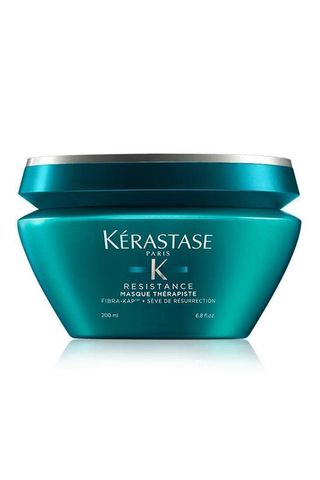
Per this product's name, it's formulated specifically for hair that's been damaged from chemical treatments, heat, and/or dye. So if split ends, brittle strands, dullness, and breakage are among your hair concerns, you're going to want to add this to your shower set up, STAT. It gets to work at a rapid pace, and I promise you'll notice a difference in your hair's health after just one use.
Pros: easy to use; fast results; reverses damage; softening
Cons: expensive
Customer Review: "My processed hair was breaking off in little pieces. I couldn’t even touch it or detangle without breakage. This saved my hair after 2 uses. Do not over use it though. Once a month is great." -Sephora
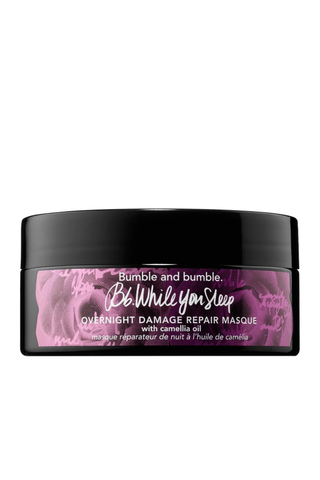
Consider this the answer to your SOS. Bumble and Bumble created an overnight treatment that gives damaged hair an intensive treatment while you catch up on sleep. All you have to do is apply a generous amount of product from root to tip before bed, secure your hair with a shower cap (or place a towel down on your pillow), and wait until morning to jump in the shower and see results. You’ll be mesmerized by how healthy your hair looks and feels. If you don’t have time for an overnight treatment, you can reap a decent amount of benefits by just leaving this on for 20 minutes.
Pros: Deeply hydrating; Good for all hair types; Repairs and protects
Cons: Feels a bit slimy
Customer Review: "I have really really thin, long hair. This means two things: it gets tangled immediately if you even look at it the wrong way, and I'm riddled with dry, split ends. This masque has helped so much with both of these issues. The ends were a serious problem; they felt like straw and looked awful. I noticed a HUGE difference after just one application: the ends are smoother and much softer. I also use this whenever I need to detangle my hair, esp after uh, certain strenuous activities. My hair just becomes so knotted that brushing through is extremely painful and takes literally an hour. If I put this in for half an hour and wash it out, the tangles just melt away. It's expensive, but I don't have to use too much of it to get the results I'm looking for, so with my thin hair, the tub lasts me a while." -Sephora
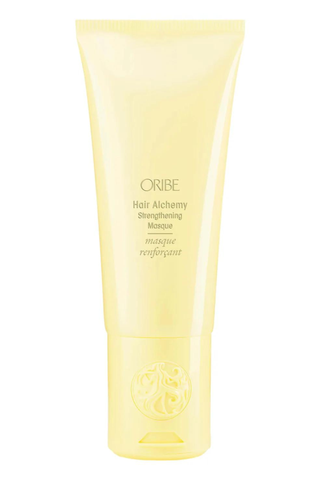
Repairing damaged hair is half the battle—making sure your hair doesn’t suffer any more is the other half. Enter: Oribe’s strengthening mask. Its sole goal is to make each hair more durable, stronger, and better able to withstand heat or styling-induced breakage. The mask can be used for 20ish minutes, but I personally like to load up (especially with my baby hairs), slick my hair back into a bun, and let the formula work its magic all day long. Once I shower, my hair feels noticeably thicker and healthier.
Pros: Prevents against future damage; Smells great
Cons: Expensive
Customer Review: "Worth the hype: This left my chemically altered blonde hair so smooth and soft and bouncy and just feeling amazing/ I blow dry brush my hair after every shower, causing a massive amount of damage, but this masque helped it so much." -Sephora
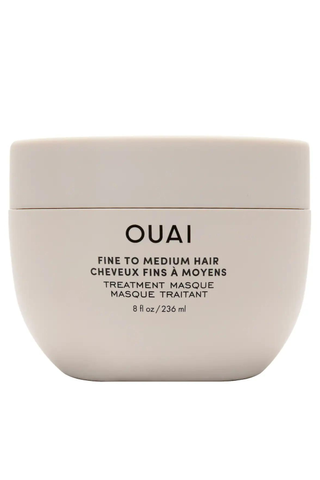
Very few products will work the same on fine, thin, straight hair as they will on curly, thick, coily hair. It’s *really* hard to formulate a hair mask to do it all. That is why the team over at Ouai decided to create a restorative treatment mask in different variations, each of which cater to a very specific hair type. The mask for thin hair won’t weigh anything down, whereas the mask for thick hair will provide adequate hydration. It’s why the mask has become a cult favorite—it really does what it says. Plus, every single option has a lovely floral scent.
Pros: Specialized treatment; Restores hydration and shine
Cons: Doesn’t leave hair extremely soft
Customer Review: "I love the scent, and I love the way my hair has been feeling since I started using it. I've used it three times now, and my hair remains soft and tamed after its use until the next use. I was worried about residue, but I haven't had any after." -Sephora
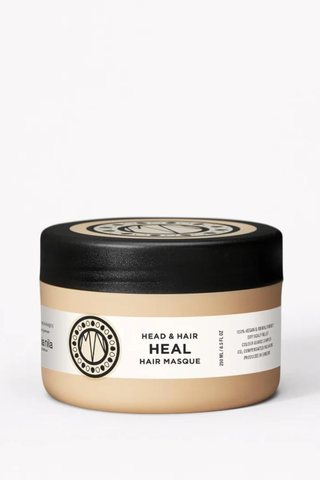
In addition to strengthening and hydrating every last strand, this hair mask provides anti-inflammatory benefits to your scalp. So that dandruff, irritation, and itchiness? Consider it soothed. As a result, new hair growth is going to be stronger, healthier, and generally more resilient. This is an allergen-free formula with no synthetic fragrances, contains a Color Guard formula to maintain your color-treated hue, and is going to provide protection from UV damage. If you want to up the ante on the benefits, pair the mask with the Head & Hair Heal shampoo and conditioner.
Pros: Calming and soothing to scalp; Good for sensitive skin
Cons: Not necessary for oily scalp
Customer Review: "I love the scent, and I love the way my hair has been feeling since I started using it. I've used it three times now, and my hair remains soft and tamed after its use until the next use. I was worried about residue, but I haven't had any after." -Maria Nila
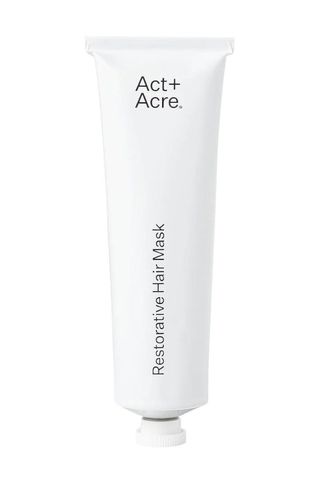
I'm obsessed with Act + Acre's hair products. This hair mask, along with the rest of the line, is infused with natural ingredients like castor oil and shea butter, both of which help with my curl definition and support healthy hair growth. There's no shortage of fatty acids and proteins in the formula either, which make it a savior for even the driest, most dehydrated strands.
Pros: editor-approved; gentle scent; contains natural ingredients; vegan; free of sulfates, silicones, parabens, and phthalates; color-safe
Cons: expensive
Customer Review: "After a day out in the sun, I always use this hair mask. It seems to balance my hair and puts the texture back to normal." -Revolve
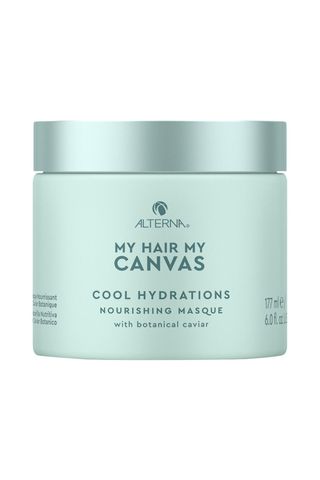
Unlike most hair masks, which are made for thick, curly, hair, this buttery hair mask works well on straight hair by providing substantial moisture without weighing strands down. I promise: You won't look greasy or flat—it's a lightweight formula that nourishes without heaviness. Plus, it only needs to be left in for two to three minutes, so it's easy to incorporate into any haircare routine.
Pros: vegan; works well on straight and thin hair
Cons: contains sulfates
Customer Review: "I loved the hair mask. I have very thin and straight hair and that is why it gets tangled a lot. It helped me to leave it soft and I can brush it more easily." -Sephora
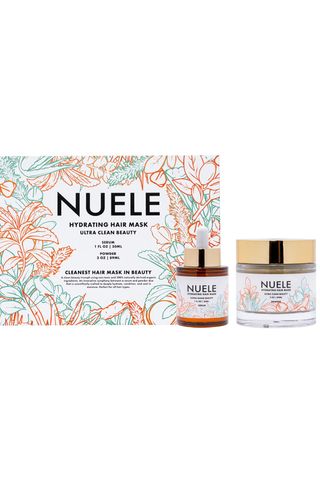
I love this unique mask from Nuele. It's made from natural ingredients, and comes with two components: a serum and a powder. The two, when mixed, create a rich mask that helps hydrate hair, detangle, and diminish frizz. It is a bit labor-intensive compared to other products on the list, but I notice such quick results it's 100 percent worth it.
Pros: clean; quick results; charitable brand
Cons: expensive; needs to be mixed before it's used
Customer Review: "I tried this hair mask for the first time and it was hands down the best I've tried so far. Mixing the mask was easy. I added avocado to the mix. Once applied to my hair I could feel a pleasant tingle on my scalp, which let me know that it was working. I almost forgot it was on my hair after that. When I did rinse it out it was clean and easy. I could immediately feel the texture of my hair getting softer as I rinsed it out. Afterwards, I applied a bit of the Nuele hair oil and dried my hair. Right now my curls are SHINING! My hair has been damaged by hair coloring so this product really brought my beautiful curls back to life. They are so soft." -Nuele
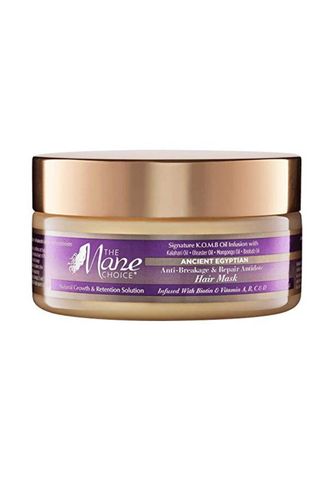
"The Ancient Egyptian Anti-Breakage Hair Mask leaves hair looking and feeling stronger overall," says James. "It nourishes, protects, minimizes breakage, and helps hair bounce back from damage. Hair that is prone to breakage and split ends, weak or damaged will benefit greatly from this formula infused with Kalahari Oil, Oleaster Oil, Mongongo Oil, and Baobab Oil to strengthen, add shine, and help to repair hair strands. This restorative blend also includes Omegas 3, 6, and 9."
Pros: reduces frizz and breakage; expert-approved; affordable
Cons: none found
Customer Review: "Great on wet or dry hair. It smells good too. I use it on my hair when it’s wet and let it dries and my hair is so manageable and it is also making my hair grow longer too." -Sally Beauty
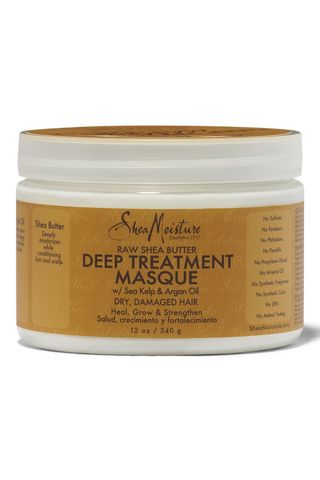
This treatment from SheaMoisture is my go-to—and should be for anyone with curly hair. It has a gentle scent, just the right amount of thickness, and my hair immediately feels softer after each use. It also doesn't weigh down my curls—a huge plus in my book. It strengthens them, hydrates my ends, and even helps bring my curl pattern back to life.
Pros: affordable; immediate results; editor-approved; cruelty-free
Cons: strong scent
Customer Review: "Love this hair mask. Leaves my dry brittle hair soft and silky. No harsh or unnecessary ingredients so I know it's good for my hair. Helped to restore moisture and texture." -Sally Beauty
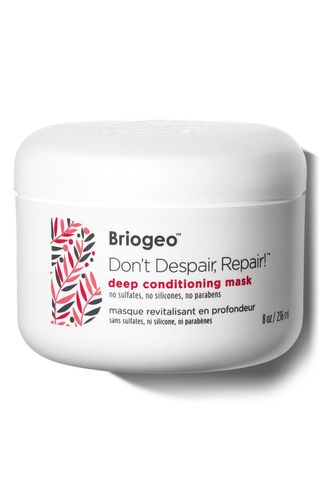
This mask is a bestseller, and with good reason. It's intensely hydrating and works to repair hair that's been damaged by chemicals, heat or general over-processing. With continual weekly use, users say that it increases softness, defines curls, and reduces the appearance to damage from bleaching or coloring. I will say: It is deeply conditioning, so it might be too much for fine hair. If you do choose to use it, use very minimal product and do a double shampoo afterwards.
Pros: cruelty-free; vegan; free of sulfates, phthalates, parabens, silicones, and petrochemicals
Cons: none found
Customer Review: "Only been using this for two weeks and I already see a huge difference. My hair is already a lot more soft and way less frizzy." -Nordstrom
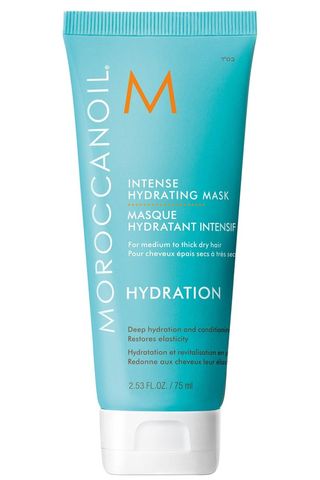
This mask is perfect for thick hair that needs a little extra TLC. It takes just five minutes of your time, once a week, and voilá! Hydrated hair with minimal frizz. Its star ingredient is argan oil, which is loved by hairstylist for its deeply nourishing powers. Reviewers also note that while it packs an impressive punch of hydration, it never weighs hair down.
Pros: free of parabens, sulfates, and phthalates; gentle scent
Cons: contains silicones
Customer Review: "A fairly small amount of this mask is enough to bring a lot of moisture, smoothness, softness, and control to my hair. It is much better than other more expensive brands. Not to mention that I also love the smell, very nice but also sophisticated." -Nordstrom
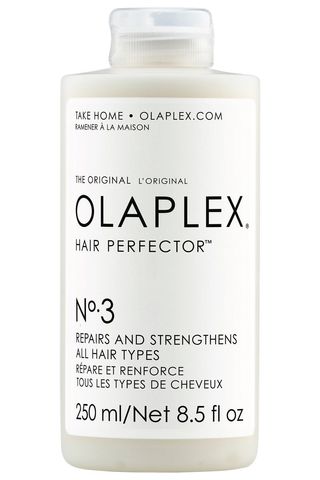
This cult-favorite mask has a following for a reason. It's specifically created to help minimize and heal damage from heat tools and hair dye. Reviewers say that it made a noticeable, visible difference in the health and appearance of their hair (split ends quite literally vanish), but note that it's important to follow the directions on the bottle to a T. Otherwise, you might be left with weighed down hair or a little residue.
Pros: clean; works on all hair types and textures; easy to use
Cons: contains sulfates
Customer Review: "I love Olaplex No. 3. One of my MUST-HAVE hair products. I absolutely swear by it. My hairdresser recommended it and we always do it after bleaching my hair platinum blonde. It brings my natural curls back!" -Sephora
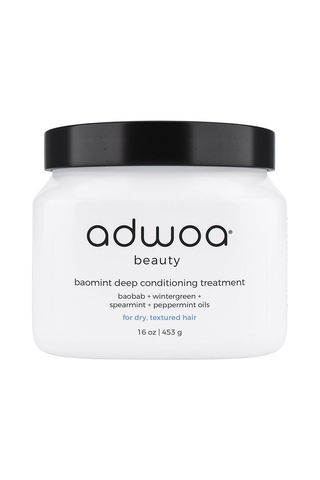
Reviewers with all hair types love this mask for its hydrating and shine-enhancing capabilities. It's specifically formulated for curly, wavy, and coily hair thats medium or thick, so you know it's going to actually deliver on its promise to hydrate textured hair. Plus, this minty formula also supports scalp health, and customers with dry, flaky scalps attest to its ability to soothe and moisturize this tricky area.
Pros: clean; vegan; made with curly and coily hair in mind; silicone-free; supports scalp health
Cons: expensive
Customer Review: "For having curly hair, I’ve tried almost EVERYTHING for my hair to look healthy and hydrated. This treatment by far is the best! My curls are super defined and my hair looks overall healthy and hydrated! Definitely one of my best purchases." -Sephora
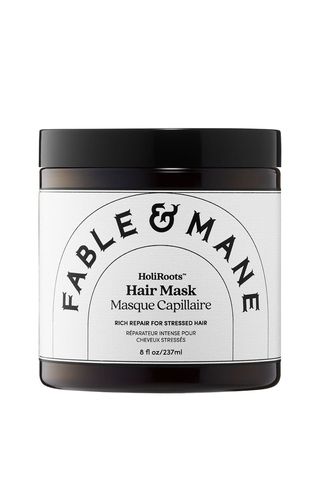
This ginger-scented mask from Fable & Mane supports both follicular and scalp health, formulated for hair that's been impacted or damaged by environmental stressors. Users write that their hair feels stronger after just a few uses, and that the mask is easy to incorporate into their existing routines. It's primarily hydrating in nature, which is while you'll find ingredients like coconut cream, mango butter, and banana.
Pros: vegan; shine-enhancing; silicone-free; clean; works on all hair types; easy to use
Cons: strong smell
Customer Review: "My hair was very dry from bleach. I need a cut. But wanted to try a mask. I’ve tried other ones and didn’t see a difference. But this one here I high recommend. Left my hair so soft. I love it!" -Sephora
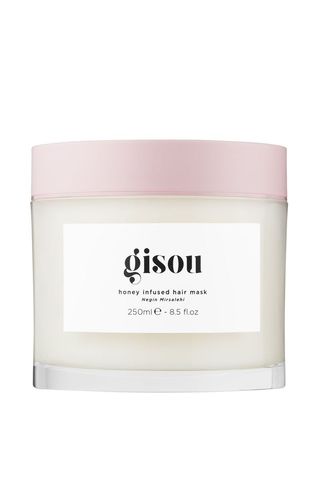
This mask is infused with honey, which not only gives it a great scent, but also helps it hydrate your hair better. The biggest pro however is the shine it delivers. I truly believe it has the power to take the dullest, driest, most lackluster hair into high-shine, glass-like reflection territory within a matter of minutes. You'll have less frizz, silkier strands, and stronger hair by incorporating this little guy.
Pros: clean; hydrating; frizz-reducing
Cons: may be too thick for those with oily scalps
Customer Review: "Can’t say enough good things about this product. I have fine hair so little goes a lot way, thus instantly after one wash made my hair the silkiest and heartiest it’s been in a long time." -Sephora
How to Use a Hair Mask
We're all pretty well-versed on how to wash our hair, and even how to style it with leave-ins, gels, and creams, but hair masks require a different routine that lies somewhere in between that of your everyday conditioner and your favorite leave-in.
Instructions may vary from product to product, so be sure to check the container on your favorite hair mask before applying. Generally speaking, however, a mask is meant to be applied to damp, clean hair. You can comb the product through to ensure even application.
"If you have straight, fine, thin hair, consider only applying the mask from the mid-lengths to ends of your hair," says James. "This will still allow you to reap the benefits of the hair mask without weighing your hair down or causing any excessive oiliness at the root."
On the other hand, for those with thick, dry, textured, curly, or damaged hair, she advises, "Start with the minimum recommended and increase as needed. You will know when you have ample amount for your hair density and texture because there will be even distribution of product and your fingers will glide through from root to ends while releasing the tangles."
Then, leave the hair mask on for the time recommended on the bottle (some masks are meant to be left on for 30 minutes, while other, more high-potency options are to be left on for only ten minutes). "Some hair masks require longer times than others or heat to maximize its benefits," explains Aronson. "If a more intense conditioning treatment is required, use heat by covering the hair with a plastic cap or sitting under a hair dryer for deeper penetration."
Personally, I like to leave my hair masks on for the maximum amount of time suggested, and I contain my drenched strands in a shower cap while the conditioner sits. This both maximizes the formula's hydrating effects and keeps my skin from getting covered in the mask.
How Often to Use a Hair Mask on Damaged Hair
As for how often should you use a hair mask? Both Aronson and James say that frequency completely depends on the needs and condition of your hair.
"If your hair is more dry or brittle, then a weekly hair mask is recommended in order to maintain hydration," says Aronson. "If the hair is in a healthier state with no chemical manipulation, then a monthly hair mask is more appropriate. Also, in the winter you may find you need to use a hair mask more frequently due to dryer weather."
James seconds this. "Based on your hair type, you should consider deep conditioning your hair after each wash day for drier, more damaged strands and/or hair that has been over manipulated," she says, "Or, once or twice a month for maintenance works fine if your hair isn’t lacking nourishment or showing any deficiencies."
Meet the Experts
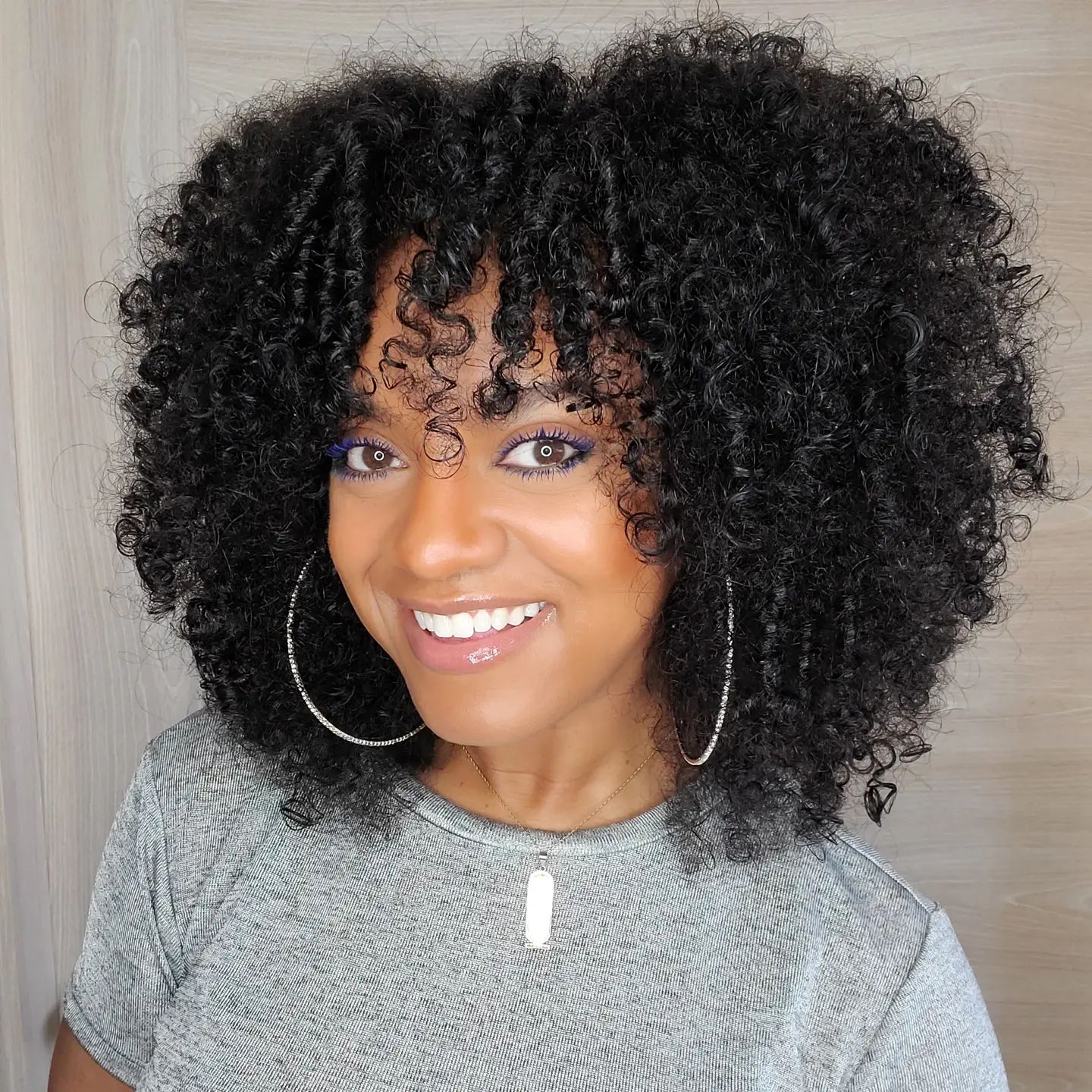
Cataanda James is a natural hairstylist and brand educator for The Mane Choice. Currently, she's based in New York City.
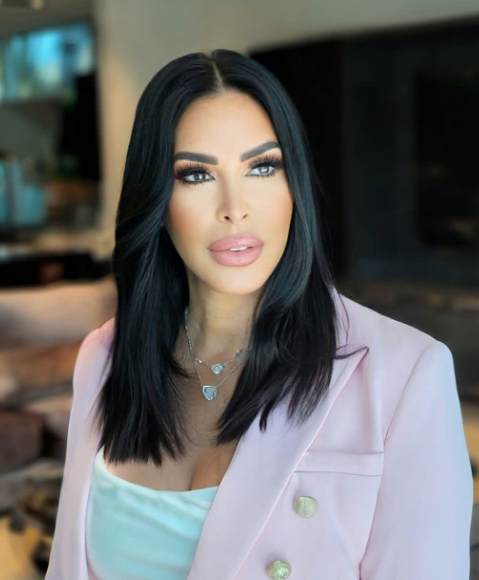
Carolyn Aronson has over 20 years of experience working as a hairstylist and salon owner in multiple states across the US. Her brand, It's A 10 Haircare, champions self-love through haircare and is also involved in a number of philanthropic efforts both at home and abroad.
Stay In The Know
Marie Claire email subscribers get intel on fashion and beauty trends, hot-off-the-press celebrity news, and more. Sign up here.

Gabrielle Ulubay is a Beauty Writer at Marie Claire. She has also written about sexual wellness, fashion, culture, and politics both at Marie Claire and for publications like The New York Times, Bustle, and HuffPost Personal. She has worked extensively in the e-commerce and sales spaces since 2020, including two years at Drizly, where she developed an expertise in finding the best, highest quality goods and experiences money can buy. As a film school graduate, she loves all things media and can be found making art when she's not busy writing.
-
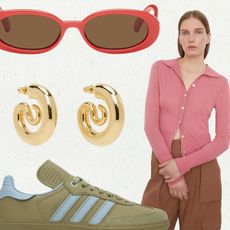 39 Items That Increased My Screen Time This Week
39 Items That Increased My Screen Time This WeekSpotted in my daydreams.
By Aniyah Morinia Published
-
 Katie Holmes Cracks the Commuter Outfit Code
Katie Holmes Cracks the Commuter Outfit CodeHer relatable wardrobe staples strike again.
By Lauren Tappan Published
-
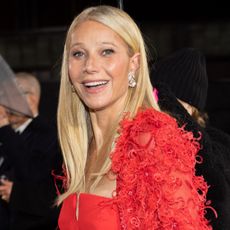 Gwyneth Paltrow Loves This Reality Show and She's Never Been More Relatable
Gwyneth Paltrow Loves This Reality Show and She's Never Been More RelatableShe's a fan of having a "slovenly day," too.
By Meghan De Maria Published
-
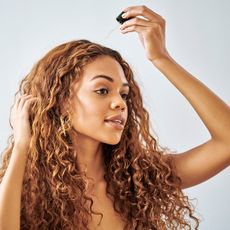 Rosemary Oil for Hair Growth: Does It Really Work?
Rosemary Oil for Hair Growth: Does It Really Work?The natural remedy went viral, but it's not a miracle worker.
By Gabrielle Ulubay Published
-
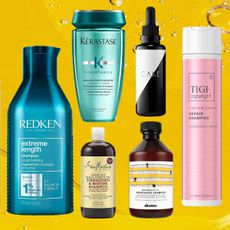 The 32 Best Hair Growth Shampoos of 2024, According to Experts
The 32 Best Hair Growth Shampoos of 2024, According to ExpertsRapunzel hair, coming right up.
By Gabrielle Ulubay Published
-
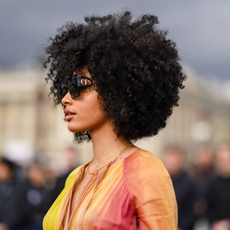 The 12 Best Deep Conditioners for Curly and Natural Hair, According to Hairstylists and Editors
The 12 Best Deep Conditioners for Curly and Natural Hair, According to Hairstylists and EditorsFight damage and frizz, rain or shine.
By Gabrielle Ulubay Last updated
-
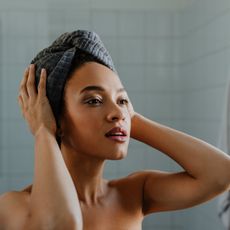 How Often You Should Wash Your Hair, According To Experts
How Often You Should Wash Your Hair, According To ExpertsKeep it fresh, my friends.
By Gabrielle Ulubay Published
-
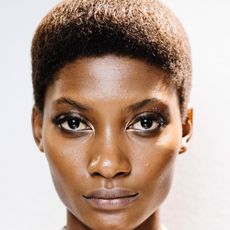 The 11 Best Magnetic Lashes of 2023
The 11 Best Magnetic Lashes of 2023Go ahead and kiss your messy lash glue goodbye.
By Hana Hong Published
-
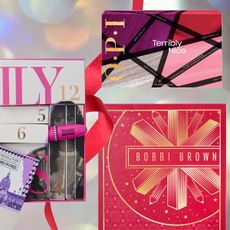 Beauty Advent Calendars Make the Perfect Holiday Gift
Beauty Advent Calendars Make the Perfect Holiday GiftThe gift that keeps on giving.
By Julia Marzovilla Last updated
-
 The 18 Best Natural Hair Products in 2023
The 18 Best Natural Hair Products in 2023Remember: Your curls are your crown.
By Gabrielle Ulubay Published
-
 The 9 Best Hot Rollers for the Curls of Your Dreams
The 9 Best Hot Rollers for the Curls of Your DreamsThis is how we roll.
By Samantha Holender Published